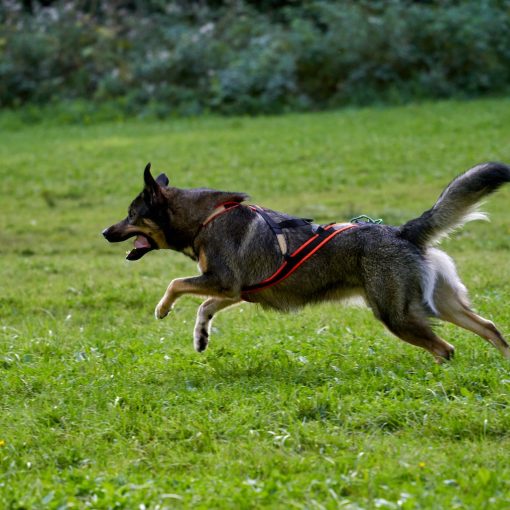German Shepherds can benefit from carrots, which are a rich source of essential vitamins and nutrients. They are high in beta-carotene, an antioxidant that supports a healthy immune system, and rich in fiber for digestive health.
Due to their low-calorie content, carrots are a fantastic food for dogs that are attempting to lose weight. To prevent choking concerns, it’s crucial to chop them into little pieces. Carrots’ crunchy texture helps keep their teeth clean, and they also contribute to a healthy, glossy coat.
Things to Know Before Feeding Carrots to Your German Shepherds
Carrots, high in sugar, should be fed in moderation to prevent weight gain and health issues, especially for your German Shepherd’s health.
Fresh, raw carrots are recommended over canned or processed ones due to added salt, while cooked carrots are safe and easier to digest, and low-sodium canned carrots are recommended.
To maintain your German Shepherd’s health, wash carrots thoroughly, cut them into small pieces to prevent choking, and gradually introduce new foods, starting with a small piece and increasing over time.
Carrots are a useful training tool due to their crunchy texture, and regular exercise through walks or playtime is essential for maintaining a healthy German Shepherd.
Choose treats that meet your dog’s specific dietary needs, such as apples, green beans, or pumpkins, and consult your veterinarian before feeding carrots.
High-quality, well-balanced dog food should be the primary source of daily calories.
Before making significant diet changes to your dog, consult your veterinarian if they show signs of allergies to carrots, or if your dog is on a special diet.
Tips On How To Feed Carrots To Your German Shepherd
To make carrot-based treats for your German Shepherd, cut them into small pieces and finely chop them using a food processor or blender.
Experiment with different flavours and textures by adding oats, peanut butter, or pumpkin puree to enhance their digestibility and texture.
Wash carrots thoroughly and remove greens to avoid toxins. If your dog has adverse reactions, stop feeding and contact your veterinarian immediately.
To protect your German Shepherd’s health, you must keep an eye on their weight and modify their diet as needed. Overfeeding can result in weight gain and other health problems, so it’s critical to select healthy treats.
Create healthy dog treats with carrots by making homemade biscuits, cookies, or frozen treats. Online recipes offer various options for carrot-based dog treats, including sweet “ice cream” for sweet-toothed dogs. These treats are a fun way to introduce your dog to vegetables.
Potential Risks Of Feeding Carrots to Your German Shepherds
German Shepherds can safely eat carrots in general, but there are a few possible hazards to be aware of.
- High sugar level
- Digestive issues
- Choking hazard
- Toxicity
-
High sugar level
Due to their high sugar content, carrots can raise blood sugar levels, which is particularly risky for German Shepherds who are predisposed to diabetes.
-
Digestive issues
Certain dogs may have an allergic reaction to carrots, which can cause digestive upset in some German Shepherds due to their high fibre content, and it’s crucial to monitor for signs of allergic reactions such as vomiting, diarrhoea, or skin irritation.
-
Choking hazard
Carrots pose a choking hazard, so they should be cut into small pieces or cooked. Start with a small amount, monitor your dog’s reaction, and consult a veterinarian before making major changes.
-
Toxicity
Excessive carrot consumption can cause vitamin A toxicity, which can lead to symptoms such as blindness, joint pain, and neurological problems.
Health Benefits Of Feeding Carrots To Your German Shepherds
Carrots offer many health benefits for German Shepherds, including:
- Dental Health
- Better eyesight
- Improved immune system
- Maintaining weight
- Training tool
- Use to divert attention
- Bonding mechanism
-
Dental Health
The crunchy texture of carrots can help to scrape away plaque and tartar from your dog’s teeth. This can help to prevent the buildup of bacteria and protect against gum disease.
-
Better eyesight
Carrots are rich in beta-carotene, which is converted into vitamin A in the body. This vitamin is essential for eye health and can help to prevent night blindness and other vision problems.
-
Improved immune system
The high levels of vitamin C in carrots can help to boost your dog’s immune system.
-
Maintaining weight
Carrots are a great low-calorie treat option, making them perfect for dogs who are watching their weight.
-
Training tool
Carrots serve as a valuable training tool for rewarding good behaviour and keeping dogs entertained and mentally stimulated, particularly for high-energy breeds like the German Shepherd.
-
Use to divert attention
Moreover, carrots can be used to divert your dog’s attention from damaging habits like over-barking or chewing on furniture.
-
Bonding mechanism
Carrots are a fun and healthy way to bond with your dog, showcasing your love and affection for them. They also provide an enjoyable way to show your love.
Not all dogs like carrots, so don’t force them to eat them. Instead, find a healthy treat that works best for your dog.
German Shepherds can enjoy fruits and vegetables like apples, broccoli, and apples, which are rich in vitamin C and fibre. However, remove the core and seeds before feeding to avoid choking hazards. Cooking raw broccoli can also aid digestion.
Ways to Keep Your German Shepherds Healthy and Happy
- To keep your German Shepherd healthy and happy, create carrot-scented toys or treats, provide mental stimulation through puzzle toys or interactive games, and show them love and affection.
- A contented dog depends on having access to clean, fresh water, mental stimulation, and loving attention.
- A diet rich in glucosamine, chondroitin, and omega-3 fatty acids will help your German Shepherd stay healthy since these nutrients support healthy joints, youthful appearance, and good skin and coats. To determine which supplements are appropriate for your dog’s specific needs, speak with your veterinarian.
- Use carrots as a training treat to reinforce positive behaviours, but use small pieces to avoid digestive issues. Overfeeding carrots to your dog can lead to digestive issues.
- To increase your German Shepherd’s vegetable intake, start with carrots, but consider other safe and healthy options like green beans, sweet potatoes, peas, and broccoli.
- Introduce new vegetables slowly and monitor your dog’s reaction to avoid adverse effects. A well-balanced diet is crucial for maintaining your dog’s health and happiness.
Read Here: Can German Shepherds Eat Cucumbers?
Frequently Asked Questions on Can German Shepherds Eat Carrots
Are Carrots safe for Puppies?
Carrots are safe for puppies, but adjust size and use mash or puree for younger ones, as they have smaller jaws.
How often can I give My German Shepherd Carrots?
The safe consumption of carrots for your German Shepherd is recommended, provided they are given in moderation and according to their weight and dietary requirements, and other healthy treats can be added.
Can I give My German Shepherd Baby Carrots?
Baby carrots are a healthy and convenient option for your German Shepherd, suitable for training and being the perfect size for most dogs. However, choose carrots without added salt or seasonings.
Is it better to give My German Shepherd Raw or Cooked Carrots?
Raw carrots are healthier for your German Shepherd, as they retain more nutrients. Cooked carrots may be easier for dogs with digestive issues, but avoid adding salt, spices, or oils. Steaming or boiling carrots without added ingredients is the best way to cook them.
Can I give My German Shepherd Frozen Carrots?
Frozen carrots are a nutritious and enjoyable treat for your German Shepherd, especially during the summer months. They become crunchy and satisfying, keeping your dog cool and enjoyable.
Conclusion
Carrots are a healthy treat for your German Shepherd, providing vitamins, nutrients, and dental and joint health benefits.
Choose fresh, raw, and unseasoned carrots and feed them in moderation. Other healthy treats include apples, blueberries, bananas, green beans, sweet potatoes, pumpkin, cucumbers, broccoli, cauliflower, and zucchini.
Consult your veterinarian before feeding new foods and introduce them slowly to avoid negative reactions.




